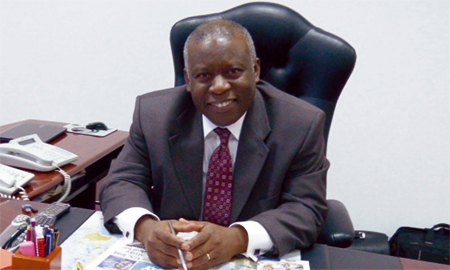The
Ghana Grid Company (
GRIDCo), a public sector energy enterprise incorporated in 2006, especially prides itself on two things: being the “backbone” to power delivery in Ghana and becoming the “company of the future” within the sector.
With unprecedented economic growth in the GDP of 13.4% last year, making Ghana the second fastest growing economy in the world, GRIDCo, along with other dominant companies in the energy sector, is considered a substantial factor in the economic growth of the nation.
“We have a power sector that is undoubtedly one of the best in Africa. The role of the power sector is to ensure that there is enough electricity – both in quality and quantity – to drive business.” Charles Darku,
CEO of GRIDCo |
“Any energy sector in the world is always the pinnacle and the backbone of the economy. Ghana’s energy sector plays the same role,” says GRIDCo’s CEO Charles Darku, who worked at Volta River Authority (VRA) for more than 27 years after studying at Harvard University. “We have a power sector that is undoubtedly one of the best in Africa. The role of the power sector is to ensure that there is enough electricity – both in quality and quantity – to drive business.”
Currently in Ghana about 68% of people have access to reliable electricity, with the aim to have full coverage by 2020. According to Mr. Darku, people are using higher levels of electricity to conduct more activities than five to 10 years ago. He adds, “This is a good sign that the economy is moving forward and the power available to drive Ghana in the right direction is doing exactly what it is supposed to do.”
Although
GRIDCo has done significant work toward providing the country with quality electricity, the company emphasizes its efforts being put into preparing for the energy industry a decade from now. Much of their work is going into both strengthening and expanding the power grid in Ghana. In a recent €82.2 million ($103 million) loan deal with the European bank Societe Generale, GRIDCo will allocate the money to both modernizing substations and expanding the northern lines of the energy grid.
“The energy sector has to be ahead of the game in the sense that it should be ahead of demand. There is a growing interest in Ghana, which can be seen in the increasing levels of investment and development,” explains Mr. Darku. “With oil and gas coming on stream there is going to be additional investment, so we have to be ahead in terms of infrastructure and the supply.”
The U.S. is the top investor in the energy sector, investing over $407 million so far this year. Mr. Darku also points out that the Ghanaian energy sector was modeled after the American system, specifically the Tennessee Valley Authority hydro system. Because of the similarities with the technologies used in the systems, American engineers would be able to easily assimilate to a work environment in Ghana.
With an ever-growing number of foreign investors and a modernizing culture, Ghana relies on its energy sector.
“Society has become even more dependent on electricity, to the point where we simply cannot fail to emphasize its importance,” says Mr. Darku.
“The economy is held together by the quality of the energy sector.”

0 COMMENTS